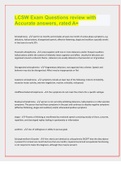-
1. Exam (elaborations) - Lcsw exam prep questions and answers, 100% accurate, rated a
-
2. Exam (elaborations) - Social work lcsw exam (practice). questions and answers, 100% accurate. rated a
-
3. Exam (elaborations) - Lcsw exam prep questions and answers, 100% accurate, graded a+
-
4. Exam (elaborations) - Lcsw questions & answers. 100% accurate, rated a+, questions bank.
-
5. Exam (elaborations) - Sample lcsw test questions & answers. 100% accurate. rated a+
-
6. Exam (elaborations) - Lcsw exam questions and answers, 100% accurate, rated a+
-
7. Exam (elaborations) - Lcsw exam prep questions & answers, accurate. graded a+
-
8. Exam (elaborations) - Lcsw study guide - clinical exam questions and answers, 100% accurate.
-
9. Exam (elaborations) - Lcsw – research questions & answers, 100% accurate. rated a+
-
10. Exam (elaborations) - Lcsw law & ethics practice testbank questions and answers. 100% accurate.
-
11. Exam (elaborations) - Lcsw exam i questions and answers, 100% accurate. graded a+. verified.
-
12. Exam (elaborations) - Lcsw exam section 2- assessment, diagnosis, and treatment planning, exam recap. rated...
-
13. Exam (elaborations) - Lcsw exam questions and answers, 100% accurate, rated a+
-
14. Exam (elaborations) - Lcsw law & ethics practice exam questions and answers, 100% accurate, rated a+
-
15. Exam (elaborations) - Lcsw exam prep 3, questions and answers, 100% accurate, rated a+. latest version.
-
16. Exam (elaborations) - Lcsw + exam review. questions prep review. rated a+
-
17. Exam (elaborations) - Lcsw exam questions review with accurate answers, rated a+
-
18. Exam (elaborations) - Lcsw exam questionable section review, full coverage, rated a+
-
19. Exam (elaborations) - Lcsw exam prep: stages of development/age and stages. 100% accurate, rated a+
-
20. Exam (elaborations) - Lcsw test prep california-- law and ethics, questions and answers, rated a+
-
21. Exam (elaborations) - Important people lcsw exam prep accurate, rated a+. verified.
-
22. Exam (elaborations) - Lcsw exam: therapist development center, questions and answers, rated a+
-
23. Exam (elaborations) - Lcsw exam prep, questions and answers, 100% accurate, rated a+
-
24. Exam (elaborations) - Lcsw exam questions and answers, accurate. verified grade a+
-
25. Exam (elaborations) - Lcsw exam: assessment, diagnosis, and treatment planning, questions and answers, rate...
-
26. Exam (elaborations) - Lcsw exam quick study: substance abuse, questions and answers, rated a+
-
27. Exam (elaborations) - Lcsw +, exam preview, full coverage, 100% accurate, verified.
-
28. Exam (elaborations) - Lcsw exam prep, top questions and answers, 100% accurate. verified.
-
29. Exam (elaborations) - Social work lcsw exam (practice), top questions and answers, graded a+, verified.
-
30. Exam (elaborations) - Lcsw exam prep, top exam questions and answers, 100% accurate, graded a+
-
31. Exam (elaborations) - Sample lcsw test questions & answers.100% accurate, graded a+
-
32. Exam (elaborations) - Lcsw exam. top exam questions and answers, 100% accurate, graded a+
-
33. Exam (elaborations) - Lcsw test bank. exam prep 3, top exam questions and answers, 100% accurate, rated a+
-
Show more




